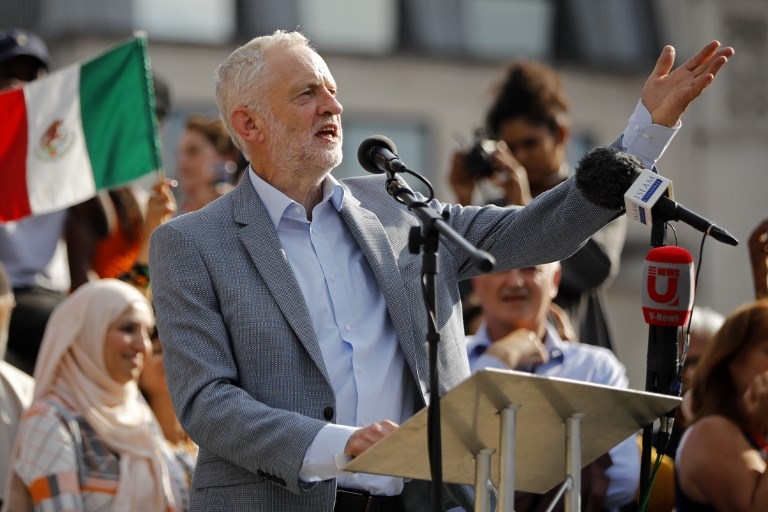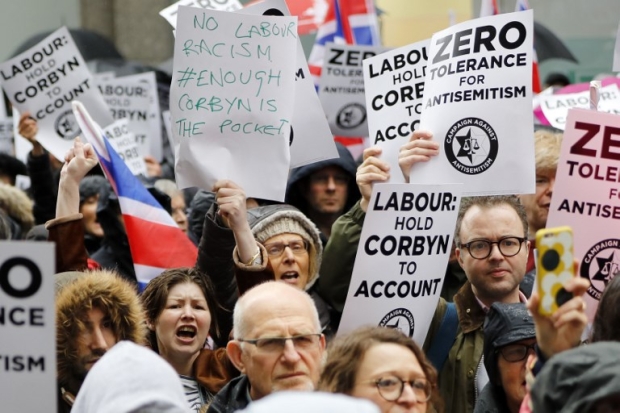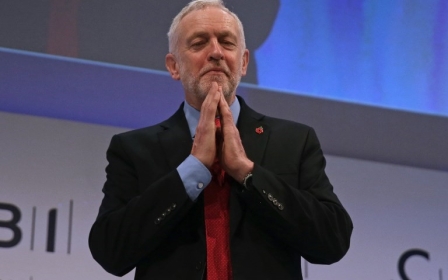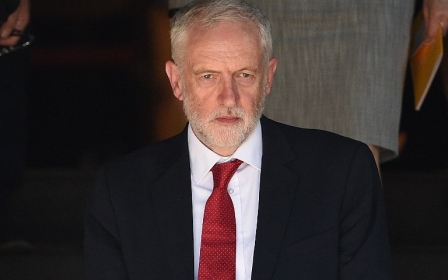Labour move to endorse IHRA could harm both Palestinians and the party

In the face of direct appeals not to do so from Palestinian civil society, the highly respected former Palestinian ambassador to the UK, the Palestine Solidarity Campaign, prominent figures in the anti-war movement and many supporters of Jeremy Corbyn, it seems likely that Tuesday’s meeting of the Labour Party national executive will adopt the International Holocaust Remembrance Alliance (IHRA) definition of anti-Semitism and all its attendant examples.
Supporters of the state of Israel in Labour have already made it clear that the adoption of the IHRA examples is the start of a new campaign, not the end of one
The definition itself is uncontroversial, although the Labour Party has not adopted any similar definition of any other form of racism. Most of the examples are similarly uncontroversial, which is why Labour's NEC adopted them into its own code of conduct at a previous meeting.
But under the pressure of a weeks-long, sustained attack from pro-Israel figures in the Jewish community and on the right of the Labour Party, amplified by the right-wing press, some in the Labour leadership now want to include all the IHRA examples. This would make it a disciplinary offence for a Labour Party member to describe Israel as a "racist endeavour" or to treat Israel any differently from any other "parliamentary democracy".
Deep consequences
This strikes at the heart of how many Palestinians and their supporters understand a state that was founded by the use of terror to drive 750,000 Palestinians, a majority of the population, from their land; which continues to expand illegal settlements; which has gone to war with every state with which it has a border; and which now, after the recent passage of a nation-state law, is an avowedly confessional state.
The consequences of such a decision will run far deeper than simply making it impossible for Labour Party members to use some arguments that are the mainstay of the Palestine solidarity movement. Many Labour activists already feel intimidated from participating in Palestine solidarity events, and that chilling effect will be magnified.
Will prominent Labour figures agree to speak on platforms with those who don’t agree with the IHRA examples? Will organisers self-censor by not inviting such speakers, if it means losing a prominent Labour speaker?
More than this, once Labour has accepted this definition, it will affect the rest of the movement. Will prominent Labour figures agree to speak on platforms with those who don’t agree with the IHRA examples? Will organisers self-censor by not inviting such speakers, if it means losing a prominent Labour speaker?
Labour is a big social institution, so the influence of this decision will be felt in the trade union movement and across local government. Supporters of the state of Israel in Labour have already made it clear that the adoption of the IHRA examples is the start of a new campaign, not the end of one. So, unions will be urged to follow the Labour Party example, and local councils will be under similar pressure.
Even where Labour supporters do not wield direct influence, in universities for instance, the pressure to close down debate is already intense, and will be intensified further as the Labour Party’s decision is cited as precedent.
Divided left
This reverse is all the more serious because it's the result of a divided left.
In all previous attempts to unseat Corbyn, the so-called "chicken-coup" of mass shadow cabinet resignations or the leadership challenge by Owen Smith, it has been a straightforward contest between the left and continuity Blairites. But this time, it's different.
The drive to adopt all the IHRA examples has been led by the very movement established to support Corbyn, Momentum, and especially by its best-known figure, Jon Lansman. Lansman had previously thought that the Labour code without the full IHRA examples was a gold standard among party statements on this issue and that the adoption of all the IHRA examples would prevent legitimate criticism of Israel.
McClusky urged the adoption on the basis that it would allow the party to "move on", although this was part of an article showing that the previous three apologies from Corbyn had not mollified his critics and so not allowed the party to move on.
This new move has already increased criticism, not ended it. MP Frank Field resigned the Labour whip after it was clear the NEC would likely adopt the IHRA examples in full. If it does so, it will encourage the right and the defenders of the state of Israel, as they have already made abundantly clear.
Further clarifications intended to be included by the NEC to soften the adoption of the full IHRA examples, the so-called Code Plus, will be of very limited use. At best, they will make the code a self-contradictory fudge, and this will not stop it being seen as a defeat for Corbyn - a defeat broadcast far and wide.
Any qualification of the IHRA code will become the focus of further attacks, and then Corbyn and his supporters will be said to be in breach of their own code, whether or not the code results in retroactive disciplinary action. The political damage will be done.
Serial retreats
The thought of those urging adoption of the IHRA examples might be that foreign policy doesn’t matter and compromise here will allow us to proceed with the “really important” domestic agenda. But the serial retreats on opposition to Trident, NATO membership, and now Palestine will not empower the Labour Party; they will disempower it.
Many supporters will be demoralised, and the party’s enemies will know that the kind of pressure brought to bear on this issue can also work over nationalisation of the banks or railways, spending on the National Health Service … or anything.
That’s why failing to confront Labour’s enemies will mean not just a defeat inflicted on Palestinians and the Palestinian solidarity movement by the Labour Party, but a self-inflicted defeat for the Labour Party.
In all this, one point of light emerges: The overwhelming majority of supporters of the Palestinian cause have always been clear that anti-Semitism has to be fought tooth and nail. But they have also always resisted the view that Zionism is a synonym for Jewish people as a whole.
How could that possibly be true when some of the most powerful Zionists in the world are not Jews, and when some of the most respected allies of Palestinians are Jews? After all, Steve Bannon, Trump’s alt-right alter-ego, has just declared himself a "Christian Zionist", and British politician Michael Gove has said he is "proud to be a Zionist".
Whether or not it is Labour Party policy, millions will continue to support the Palestinian struggle for liberation, because it is one of the defining causes of our era.
- John Rees is a Visiting Research Fellow at Goldsmiths, University of London, and a national officer of the Stop the War Coalition.
The views expressed in this article belong to the author and do not necessarily reflect the editorial policy of Middle East Eye.
Photo: Labour Party leader Jeremy Corbyn speaks in Trafalgar Square on 13 July 2018 (AFP)
Middle East Eye propose une couverture et une analyse indépendantes et incomparables du Moyen-Orient, de l’Afrique du Nord et d’autres régions du monde. Pour en savoir plus sur la reprise de ce contenu et les frais qui s’appliquent, veuillez remplir ce formulaire [en anglais]. Pour en savoir plus sur MEE, cliquez ici [en anglais].






